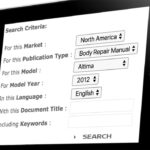Understanding your Volkswagen’s diagnostic trouble codes (DTCs), often referred to as fault codes, is crucial for effective vehicle maintenance and repair. These codes, generated by your car’s On-Board Diagnostic (OBD) system, provide valuable insights into potential issues affecting your VW’s performance. While a comprehensive “Vw Fault Codes List Pdf” might be challenging to find due to the constant updates and variations across models, this guide will equip you with essential knowledge to interpret common VW fault codes and address potential problems. Accessing these codes requires an OBD-II scanner.
Common VW Fault Codes and Their Meanings
The following table outlines some frequently encountered VW fault codes and their potential underlying causes. Remember, this is not an exhaustive list, and specific codes can vary depending on your VW’s model and year. Consulting a factory repair manual for your specific VW model is recommended.
| Code | Potential Problems |
|---|---|
| P0010 | Powertrain Control Module (PCM) failure, Variable valve timing actuator malfunction, Wiring issue |
| P0101 | Mass Air Flow (MAF) Sensor issues (e.g., leaks, faulty sensor, wiring problems), Barometric Pressure Sensor problems |
| P0171 | System Too Lean (Bank 1), potential vacuum leaks, MAF sensor issues, fuel delivery problems |
| P0300 | Random/Multiple Cylinder Misfire Detected, often related to spark plugs, ignition coils, fuel delivery, or compression issues |
| P0420 | Catalyst System Efficiency Below Threshold (Bank 1), potential catalytic converter failure, oxygen sensor issues |
| P0440 | Evaporative Emission Control System Malfunction, often caused by a loose gas cap, EVAP system leaks, or faulty components |
| P0500 | Vehicle Speed Sensor Malfunction, potential issues with the speed sensor, wiring, or the vehicle speed sensor drive gear |
| P0700 | Transmission Control System (TCS) Malfunction, indicating a general transmission problem requiring further diagnostics |
| P2002 | Diesel Particulate Filter (DPF) Efficiency Below Threshold (Bank 1), often requiring DPF regeneration or replacement |
| U0001 | High-Speed CAN Communication Bus Performance, indicating a communication error within the vehicle’s network |
Decoding VW-Specific Fault Codes: Beyond the Generic OBD-II Codes
While many OBD-II codes are generic across car manufacturers, Volkswagen utilizes specific codes starting with “P1XXX” that provide more detailed diagnostics related to VW systems. These manufacturer-specific codes require specialized VW diagnostic tools and expertise for accurate interpretation.
What to Do When Your VW Displays a Fault Code
When your VW’s check engine light illuminates, promptly retrieving and interpreting the fault code is essential.
- Use an OBD-II Scanner: Connect a scanner to your VW’s OBD-II port (usually located under the dashboard) to retrieve the code.
- Consult Resources: Utilize online resources, repair manuals, or this guide to understand the potential causes associated with the code.
- Seek Professional Help: For VW-specific “P1XXX” codes or complex issues, consult a qualified VW technician. They possess the necessary tools and expertise for accurate diagnosis and repair. Addressing these issues quickly can prevent further damage and ensure your VW’s optimal performance.
Finding a Reliable VW Fault Code List PDF
While a comprehensive, up-to-date “VW fault codes list PDF” encompassing all models and years might not be readily available online, valuable resources for VW fault code information include:
- VW Factory Repair Manuals: These manuals provide the most accurate and detailed information specific to your VW model.
- Reputable Online Forums: VW enthusiast forums often contain discussions and resources related to specific fault codes.
- Professional Diagnostic Software: VW technicians utilize specialized software with extensive fault code databases.
By understanding your VW’s fault codes and utilizing available resources, you can maintain your vehicle effectively and address potential problems proactively.

